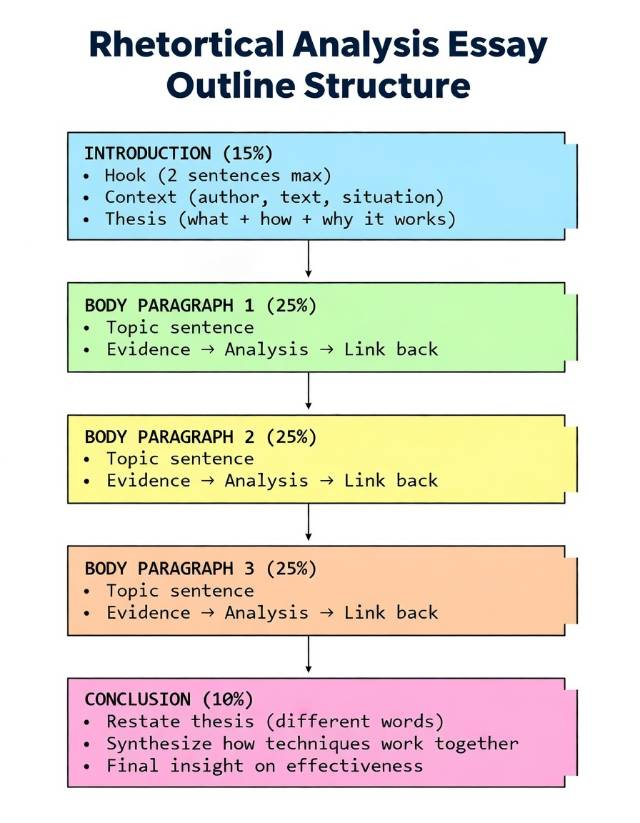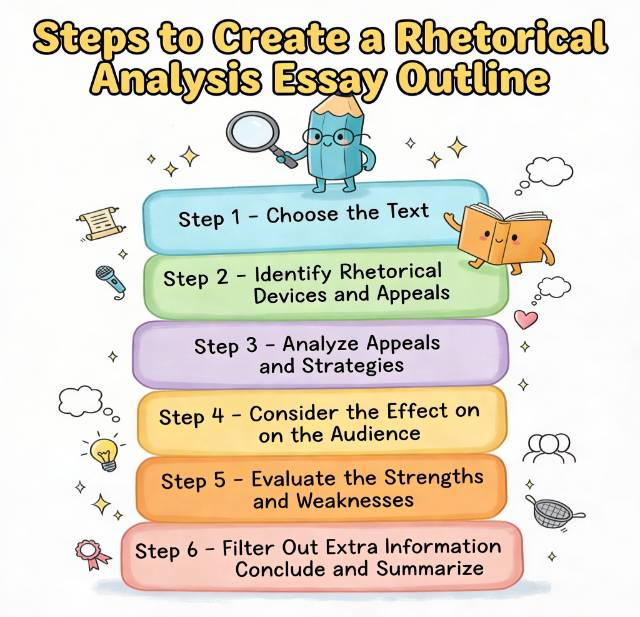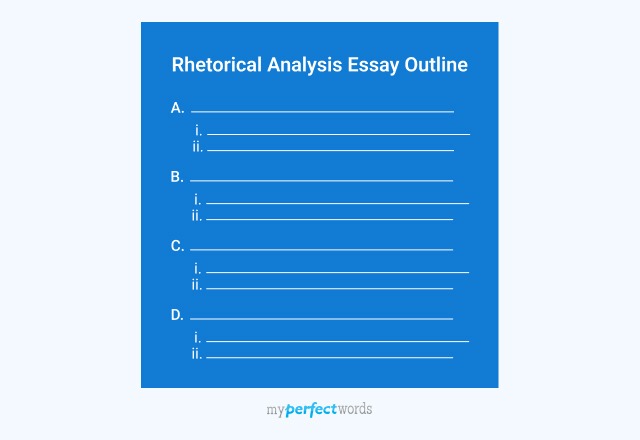Writing a rhetorical analysis essay requires a writer to draft a structured piece of writing.
An outline organizes the raw information and makes it understandable for the readers. It serves as your compass, ensuring you stay on course throughout the rhetoric essay. It helps you structure your ideas and arguments, adding clarity to your essay writing process.
Moreover, an outline works as a checklist for your essay. It assures you that nothing important is missed in the content.
Components of a Rhetorical Analysis Outline
Now that we've explored why creating an essay outline is essential, it's important to explore the different components of a rhetorical analysis outline.
Here’s a detailed rhetorical analysis essay outline:
I. Introduction II. Rhetorical Situation Analysis III. Rhetorical Strategies IV. Analysis of Rhetorical Devices V. Evaluation of Effectiveness VI. Conclusion |
Each element plays a crucial role in crafting a well-structured and persuasive analysis, so let's explore them in detail:
Rhetorical Analysis Essay Outline Template #1: Chronological Order
This template organizes your analysis by following the text from start to finish. It works best when the author's persuasive techniques change throughout the piece.
I. INTRODUCTION
Hook: [Attention-grabbing opening]
Context: [Author, text, audience, situation]
Thesis: [Author's name] uses [technique 1], [technique 2], and [technique 3] to [effect on audience]
II. BODY PARAGRAPH 1: Opening Section Analysis
Topic sentence: In the opening, [author] establishes [what]
Evidence: [Quote from text]
Analysis: This [technique] works because [effect on audience]
Link back: This sets up [author's] credibility/emotional connection
III. BODY PARAGRAPH 2: Middle Section Analysis
Topic sentence: As the argument develops, [author] shifts to [what]
Evidence: [Quote from text]
Analysis: This [technique] works because [effect on audience]
Link back: This intensifies [author's] persuasive impact
IV. BODY PARAGRAPH 3: Closing Section Analysis
Topic sentence: In the conclusion, [author] reinforces [what]
Evidence: [Quote from text]
Analysis: This [technique] works because [effect on audience]
Link back: This leaves the audience feeling/thinking [what]
V. CONCLUSION
Restate thesis: [Author] effectively uses [techniques]
Summary: These strategies work together to [overall effect]
Final insight: The success lies in [why it persuaded the audience]
When to use this: Your text has clear sections with different persuasive strategies (like a speech that opens with ethos, builds with pathos, closes with logos), or your assignment asks you to analyze how the argument builds over time.
Rhetorical Analysis Essay Outline Template #2: By Rhetorical Appeal
This template organizes your analysis around ethos, pathos, and logos. It works best when the author uses all three appeals clearly throughout the text.
I. INTRODUCTION
Hook: [Attention-grabbing opening]
Context: [Author, text, audience, situation]
Thesis: [Author's name] combines ethos, pathos, and logos to [effect on audience]
II. BODY PARAGRAPH 1: Ethos (Credibility)
Topic sentence: [Author] establishes credibility through [how]
Evidence 1: [Quote showing expertise/character]
Analysis: This builds trust because [why audience believes them]
Evidence 2: [Another credibility example]
Link back: This foundation makes the audience receptive to [author's] argument
III. BODY PARAGRAPH 2: Pathos (Emotion)
Topic sentence: [Author] creates emotional connection through [how]
Evidence 1: [Quote showing emotional appeal]
Analysis: This evokes [emotion] because [effect on audience]
Evidence 2: [Another emotional example]
Link back: These emotions drive the audience toward [author's] position
IV. BODY PARAGRAPH 3: Logos (Logic)
Topic sentence: [Author] reinforces the argument with [logic/evidence]
Evidence 1: [Quote showing facts/reasoning]
Analysis: This logical structure works because [why it persuades]
Evidence 2: [Another logic example]
Link back: This reasoning validates the emotional and ethical appeals
V. CONCLUSION
Restate thesis: The combination of ethos, pathos, and logos makes [author's] argument effective
Summary: Each appeal serves a specific purpose: [brief summary]
Final insight: The balance between these appeals is what persuades [audience]
When to use this: The text clearly uses all three appeals, your assignment specifically mentions ethos/pathos/logos, or you're analyzing a well-rounded argumentative piece like an op-ed or persuasive speech.
| Need help understanding ethos, pathos, and logos? Check our detailed guide. |
Rhetorical Analysis Essay Outline Template #3: By Rhetorical Device
This template is organized by the specific techniques the author uses (metaphor, repetition, juxtaposition, etc.). It works best when the author relies heavily on a few key devices.
I. INTRODUCTION
Hook: [Attention-grabbing opening]
Context: [Author, text, audience, situation]
Thesis: [Author's name] uses [device 1], [device 2], and [device 3] to persuade [audience]
II. BODY PARAGRAPH 1: [Device 1 – e.g., Metaphor]
Topic sentence: Throughout the text, [author] employs [device] to [effect]
Evidence 1: [Quote showing device]
Analysis: This metaphor works because [how it shifts audience perspective]
Evidence 2: [Another example of same device]
Link back: These metaphors collectively create [overall impression]
III. BODY PARAGRAPH 2: [Device 2 – e.g., Repetition]
Topic sentence: [Author] reinforces key ideas through [device]
Evidence 1: [Quote showing device]
Analysis: This repetition emphasizes [what] and makes the audience [effect]
Evidence 2: [Another example of same device]
Link back: The cumulative effect is [what]
IV. BODY PARAGRAPH 3: [Device 3 – e.g., Juxtaposition]
Topic sentence: [Author] contrasts [what] with [what] using [device]
Evidence 1: [Quote showing device]
Analysis: This contrast highlights [difference] and leads audience to see [what]
Evidence 2: [Another example of same device]
Link back: This comparison ultimately supports [author's] thesis
V. CONCLUSION
Restate thesis: [Author's] use of [devices] effectively persuades
Summary: Each device serves the purpose of [brief summary]
Final insight: What makes these devices work is [why they connect with audience]
When to use this: The author uses distinctive stylistic techniques repeatedly, you're analyzing poetry or highly stylized prose, or your assignment asks you to focus on specific rhetorical devices.
Choose Which Outline Template to Use
Pick based on what's most obvious in your text:
Does the text change strategy as it progresses? (Opening vs. middle vs. ending feel different) = Use Chronological
Does the text balance emotion, credibility, and logic throughout? (You can find examples of ethos, pathos, and logos in every section) = Use By Appeal
Does the text rely on specific techniques repeatedly? (Tons of metaphors, or constant repetition, or heavy use of rhetorical questions) = Use By Device
| Still not sure? Default to chronological. It's the safest structure and works for most texts. You can always identify what type of appeal or device you're analyzing within each section. |
Rhetorical Analysis Essay Outline Structure (Visual Breakdown)
Every rhetorical analysis outline follows this percentage structure:

Each body paragraph must answer: How does this technique persuade the audience? Not what it says, but how it works.
Structure Sorted, Still Stuck?
Expert Writers Can Build Your Entire Analysis
Free expert writer's consultation
Adapting Your Outline for Different Essay Lengths
| Essay Length | Introduction | Body Paragraphs | Conclusion | Total |
|---|---|---|---|---|
| 500-750 words | 1 para | 2 paras | 1 para | 4 |
| 750-1,000 words | 1 para | 3 paras | 1 para | 5 |
| 1,000-1,500 words | 1 para | 4-5 paras | 1 para | 6-7 |
| AP Lang (40 min) | 1 para | 2-3 paras | 1 para | 4-5 |
For shorter essays: Cut to two body paragraphs and focus on the most powerful techniques. Quality over quantity.
For longer essays: Add more body paragraphs but keep each one focused on a single technique or appeal. Don't try to cover everything in one paragraph.
| AP Lang outline priority: analysis over length. Two strong body paragraphs beats three weak ones. To understand basics, check out our AP lang rhetorical analysis essay blog. |
Filled Rhetorical Essay Outline (See It In Action)
Here's the chronological template filled in using Martin Luther King Jr.'s "Letter from Birmingham Jail":
I. INTRODUCTION
Hook: In 1963, eight white Alabama clergymen criticized Martin Luther King Jr.'s protests as "unwise and untimely."
Context: King responded from jail with a letter defending nonviolent resistance and explaining why direct action was necessary.
Thesis: King uses appeals to shared religious values, emotional descriptions of injustice, and logical explanations of timing to persuade moderate white clergy that immediate action is justified.
II. BODY PARAGRAPH 1: Opening Section (Establishing Ethos)
Topic sentence: In the opening, King establishes common ground through religious authority and shared Christian values.
Evidence: "I am in Birmingham because injustice is here. Just as the prophets of the eighth century B.C. left their villages..."
Analysis: This comparison to biblical prophets positions King as a religious figure fulfilling moral duty, not a troublemaker. His audience (fellow clergy) must acknowledge this framework.
Link back: This religious credibility makes it harder for clergy to dismiss his actions as outside agitators causing problems.
III. BODY PARAGRAPH 2: Middle Section (Building Pathos)
Topic sentence: As the letter progresses, King intensifies emotional appeals by describing the lived experience of segregation.
Evidence: "When you have seen vicious mobs lynch your mothers and fathers...when you have to concoct an answer for a five-year-old son who is asking 'Daddy, why do white people treat colored people so mean?'"
Analysis: These concrete images force the white moderate clergy to confront the human cost of their "wait" advice. The child question especially creates discomfort because it's unanswerable within their framework.
Link back: This emotional weight makes "just wait" feel morally indefensible, shifting the audience from comfortable distance to uncomfortable recognition.
IV. BODY PARAGRAPH 3: Closing Section (Reinforcing with Logos)
Topic sentence: In the conclusion, King provides a logical framework for why "now" is the right time for direct action.
Evidence: "For years now I have heard the word 'Wait!'...This 'Wait' has almost always meant 'Never.'"
Analysis: King demonstrates through historical pattern that waiting equals accepting injustice. He removes "gradual progress" as a viable option by showing it never happens without pressure.
Link back: This logic validates the emotion and shared values from earlier sections, leaving clergy without a rational counterargument.
V. CONCLUSION
Restate thesis: King's combination of religious authority, emotional testimony, and logical dismantling of "wait" makes his case for immediate action compelling.
Summary: Each section builds on the previous one: credibility allows the emotional appeals to land, and logic validates both.
Final insight: The letter works because King meets his audience where they are (religious moderates) and systematically removes every justification for inaction.
Notice how each body paragraph focuses on ONE strategy. That's the key to clear analysis.
| Need more help getting started? Check out these expert rhetorical analysis essay examples to get inspired! |

Common Rhetorical Essay Outline Mistakes (And How to Fix Them)
| Mistake | Why It's Wrong | Fix |
|---|---|---|
| Outlining summary instead of analysis | You're retelling what the author says, not analyzing how they persuade | Each section must answer "how does this persuade?" not "what does this say?" |
| Mixing strategies in one paragraph | Loses focus, makes analysis unclear | One strategy per paragraph - if you're analyzing metaphor, stick to metaphor for that entire paragraph |
| No clear link back to thesis | Body paragraphs feel disconnected from main argument | Every paragraph must end with "this supports my thesis because..." and explicitly connect back |
| Skipping the "why it works" part | You're just identifying techniques, not analyzing their effect | Always explain the effect on the specific audience - don't just say "this is ethos," say "this builds credibility because..." |
The #1 outline mistake: organizing what the author says instead of how they persuade. Your outline should track persuasive moves, not content summary.
Rhetorical Analysis Essay Outline Templates
Here are some rhetorical analysis essay outline pdf that you can use as reference outlines:
Here’s a practice outline:
Bottom Line
You've got the tools and examples you need to ace your rhetorical analysis essay. The steps we've gone through provide a strong starting point for your academic journey into analyzing persuasive writing.
| Stuck in choosing a topic for next rhetorical essay? Check out our 300+ rhetorical analysis essay topics. |
Still struggling with your essay?
Stop struggling with structure and organization. Our expert writers deliver:
- Custom essays on any topic
- Perfectly organized chronological outlines
- Clear, engaging writing that follows all academic standards
- 100% original content with zero AI detection
From outline to final draft, we handle every step.
Get Started Now





-20338.jpg)